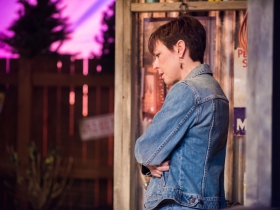Love and Pain and Journalism
Milwaukee Chamber Theatre’s “The Few” is uneven, but mysterious.
Samuel D. Hunter is an important new playwright gifted in scenarios but not reaching his peak in The Few, which is certainly a test for the actors at the Milwaukee Chamber Theatre’s studio stage through March 19. A test for the audience, too, with rewarding exchanges and then a sequence of scenes that suggest how, even in a 90-minute work, Hunter was playing with various unsatisfactory endings.
That playing around does grab hold sometimes — the way a whodunit does. Why did morose Bryan abandon The Few — his offbeat newspaper for long-distance truckers – and disappear for four years, leaving debts and newspaper in the hands of his love partner, QZ? Why has he returned and why does QZ, who expanded the newspaper into a successful collection of “lonely hearts” ads, seem both angry and skittish about his unexpected return in rags.
Why after fits of drinking and depression does Bryan explode so eloquently? Why is the young man helping around the office so enamored of Bryan’s writings and so wounded by his sneers?
Each blackout brings another plot revelation,until the lights finally go out (without ever convincingly going on).
Hunter’s choice of time is one of the play’s ironies. The story is set somewhere in Idaho in a community of truckers that find special meaning in 1999 – either anticipating that the crash of Y2K will kill us all or that the new century will bring hope. Hunter’s plays are intrigued by this hunt for meaning and connection in some rather startling places and forms.
Jody Sekas is not only a good scenic designer but something of a talented scrounger as he fills the rickety office with oddball stickers, old computers and furniture that help the audience breathe in the grubby atmosphere.
Director C. Michael Wright basically relies on the skills of two veteran leads who have to convey two levels of meaning in the plot. Mary MacDonald Kerr plays QZ as stern and businesslike, refusing to melt, but letting the melt under the ice peek through. A veteran of the American Players Theatre, James Ridge holds the stage with his stillness, moody intensity and bemused eyebrow when the ad placers call in on the speakerphone – one of the play’s more amusing devices. The believable voices on the phone were coached by and include UW-Milwaukee’s Raeleen McMillion.
There is a third actor trying to break into this natural camaraderie – Mitch Bultman as Matthew, a gay young man both attracted to this homespun version of newspaper life and aghast by the personal demons he inadvertently helps unleash.
Bultman never quite finds the convincing tone the other actors create, overdoing the hesitant stutter, stooping adolescent manner and manic outbursts. Matthew’s purpose in the story also makes this the most difficult role, requiring greater emotional finesse in moving from moment to moment. That’s a gift few have mastered, including in this outing by the playwright.
The Few Gallery
Dominique Paul Noth served for decades as film and drama critic, later senior editor for features at the Milwaukee Journal. You’ll find his blog here and here.
Review
-
Eating Burmese in Bay View
 Dec 13th, 2025 by Cari Taylor-Carlson
Dec 13th, 2025 by Cari Taylor-Carlson
-
Casablanca Is a Milwaukee Success
 Nov 30th, 2025 by Cari Taylor-Carlson
Nov 30th, 2025 by Cari Taylor-Carlson
-
Oh, Those Witty 18th Century Brits
 Nov 24th, 2025 by Dominique Paul Noth
Nov 24th, 2025 by Dominique Paul Noth
Theater
-
Oh, Those Witty 18th Century Brits
 Nov 24th, 2025 by Dominique Paul Noth
Nov 24th, 2025 by Dominique Paul Noth
-
Skylight’s Holiday Show Is Lots of Fun
 Nov 16th, 2025 by Dominique Paul Noth
Nov 16th, 2025 by Dominique Paul Noth
-
Rep’s ‘Come From Away’ Is a Triumph
 Nov 10th, 2025 by Dominique Paul Noth
Nov 10th, 2025 by Dominique Paul Noth




























James Ridge was amazing in this play. I sat in the front row and felt as if I were in the room with real people talking about and acting out their lives. And as to Hunter ascribing Bryan’s character with eloquence – well alcoholism and eloquence aren’t always mutually exclusive (think Hunter S. Thompson). Mary MacDonald Kerr as QZ was also highly believable, filled with those contradictions that inhabit most human beings – e.g. happy about Bryan’s proposal one moment and then angered and refusing it the next because he appended the name “Rick” to it – even though she knew that Rick was Bryan! It was unsettling that these two main characters didn’t come together at the end (as why shouldn’t they, since they seemed to understand each other), but Bryan just had to make do with knowing he was affecting others in a positive manner (as the phone call from a woman who talked to a guy from their paper’s single ads shows us). But all in all, what a play, and I think of so many actors around the world recreating this play with different nuances and different sets, but how glad I am that I was able to see this particular Milwaukee version! (And I had just recently seen James Ridge acting as Dickens In America – how talented he is, able to bring forth so many characters from within himself!)